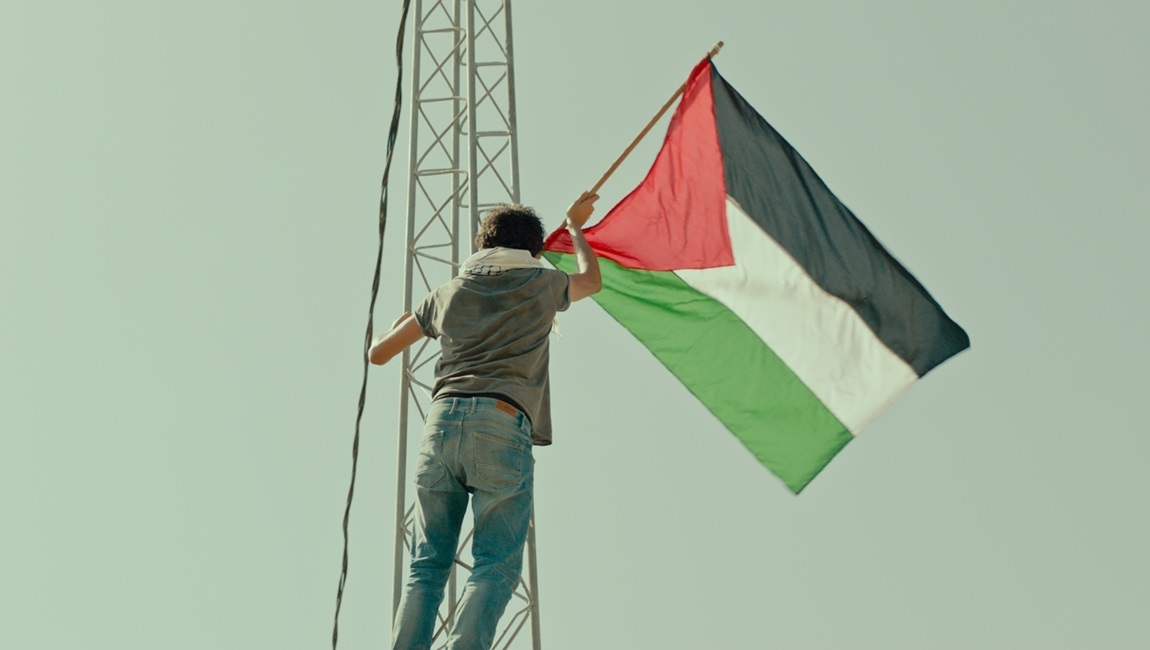The objective of any piece of art is to make us realize that the world is bigger than the inside of our own head. The very act of watching, reading, or listening to another artist, or even studio-manufactured content, is proof of that. Or maybe not. Maybe we watch, read, or listen to something simply because someone we care for cares for it. Maybe — and this is especially true when we half-listen to podcasts or half-watch movies and TV shows online — it’s just background noise that momentarily mutes the barrage of voices otherwise constantly blabbering inside our heads. When we do either of these things, we — in pretentiously cinephilic terms — aren’t willing to abandon the close-up (or our closed-up POV) for the wide shot (or someone else’s POV). Even if we reluctantly do so, we then choose, consciously or subconsciously, to blur out parts of that broader picture that don’t neatly accommodate us.
Palestinian filmmaker Firas Khoury’s feature-length debut, Alam (which translates to “The Flag”), dramatizes this dissonance between a constricted personal POV and Palestine’s ever-present political reality as a coming-of-age story of an adolescent local Arab boy named Tamer (Mahmood Bakri). Like most of his high school peers in a Palestinian village, he lives an insular life: the first thing on his mind is to get laid, the second is to smoke up with his two similarly aloof friends, and the third is to learn to drive. He has some extra privileges, too: his financially well-to-do family allows him to move into his deceased grandfather’s house-cum-storage-space next to their plush, modernist apartment simply because he desires more (personal) space. However, that angsty solitude is, very quickly, replaced by Tamer’s desire to form a physical and emotional connection with a new classmate, the beautiful and rebellious Maysaá (Sereen Khass), who also turns out to be his neighbor living in a space almost half-the-size of his grandfather’s house. His attraction pushes him into her world, which, in many ways, is diametrically opposite to his. She openly participates in political meetings and workshops that raise awareness about Israel’s ethnic cleansing of Palestinian Arabs since 1948; she supports her classmate, Safwat (Muhammad Abed Elrahman), when he calls out their class teacher for justifying Zionism by implying that Arabs “willfully” left their nation when, in fact, they were massacred and expelled by Israel in 1948; she wants to, like Safwat, raise the Palestinian flag on top of their school building on Israel’s independence day as a sign of Palestinian protest against their celebrations.
However, Tamer’s growing affection for Maysaá does not readily translate into fervor for the Palestinian rebellion. Maysaá introduces him to a social reality that he previously distanced himself from, but is Tamer really looking or listening when he’s in all those meetings? Khoury repeatedly highlights this dissonance through a mismatch between image and sound — Tamer’s erotically-charged POV shots of Maysaá’s neck deliberately undermine the effectiveness of other students’ politically charged words. Or, through a contrast between foreground and background within a frame — Tamer and his friends, casually smoking weed, look at Maysaá and her friends, at a distance from us and them, replacing an Israeli flag on a street with a Palestinian one. Or just verbatim — Safwat questions Tamer’s belief in their collective flag-hoisting gesture, to which he doesn’t provide a concrete answer.
Alam is most remarkable for not judging Tamer when he is politically inactive or, at best, unenthusiastically active. Throughout the majority of the film, it keeps reminding him (and us) through cutaways to passionately political perspectives of fellow students or off-screen sound of Israeli news channels or communist iconography and memorabilia cluttered around Tamer’s grandfather’s house that past and present ghosts of Palestinian struggle and resistance all seem to exist alongside him. If he chooses to look and listen carefully, people who he otherwise ignores — namely, Safwat — have stories to tell that strangely overlap with that of his grandfather and uncle. Save for a false declarative note that overemphasizes the impact of this particular relationship on Tamer’s political awakening, Alam is a profoundly compassionate and valuable film about a boy gradually learning to see and value personal and political details that he ignored beforehand. It’s about letting social reality, painful as it may be, in at the cost of a privileged and blinkered existence.
DIRECTOR: Firas Khoury; CAST: Mohammad Karaki, Mohammad Barki, Muhammed Abed Elrahman; DISTRIBUTOR: Film Movement; IN THEATERS: April 26; RUNTIME: 1 hr. 49 min.







